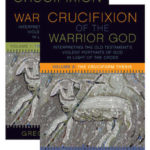We run our website the way we wished the whole internet worked: we provide high quality original content with no ads. We are funded solely by your direct support. Please consider supporting this project.

What is Progressive Revelation?
Some early church theologians argued that God had to relate to his people as spiritual infants, and over time, God’s people developed a capacity to receive clearer revelations of him. Gregory of Nazianzus, who wrote in the fourth century, claimed that God needed to allow aspects of fallen culture to get mixed in with his self-revelation; otherwise they would not have been capable of receiving it. God was acting like a wise physician who needs to blend flavorful juice with his nasty-tasting medicine.
As his people acclimated to the revelation they received, however, God was able to peel away layers of their fallen, culturally-conditioned beliefs and thereby reveal additional layers of truth about himself. This is progressive revelation.
One example of it is found in Gregory’s observation that God first “cut off the idol” from his people, but he “left the sacrifices.” Though we later learn that God doesn’t actually approve of animal sacrifices, God saw that his people at this time were too spiritually immature to abandon this barbaric practice. So, for a period of time, God graciously stooped to take on the appearance of a deity who enjoys, and even demands, the ritualistic killing of animals.
When the Israelites had grown more mature, Gregory argues, God “destroyed sacrifices,” but he “did not forbid circumcision,” though this too was also eventually removed. By taking incremental steps such as these, God grew his people to the point where at least some of them were ready to be freed completely from their past paganism. Gregory sums up the process by saying God “beguiled his people into the Gospel by gradual changes.”
This process culminated with God’s fullest and clearest revelation in Christ.
The proposal I make in Crucifixion of the Warrior God and Cross Vision is saying nothing more than this. I hold that God has always revealed his true character while stooping to accommodate the fallen and culturally conditioned state of his people as much as necessary. In his love, God was willing to allow his people to think of him along the lines of an ANE warrior deity, to the degree this was necessary, in order to progressively influence them to the point where they would be capable of receiving the truth that he is actually radically unlike these violent ANE deities. In this sense, I could agree with Gregory and say that, by making “gradual changes,” God “beguiled” his people “into the Gospel,” wherein it was revealed that God would rather be killed by enemies than to kill enemies.
—Bible, Revelation, Church Fathers
Adapted from Cross Vision, pages 72-74
Category: General
Tags: Cross Vision, Crucifixion of the Warrior God, Revelation
Related Reading

Does Paul Condone Vindictive Psalms? A Response to Paul Copan (#1)
In a recent paper delivered at the Evangelical Theological Society, Paul Copan raised a number of objections against my book, Crucifixion of the Warrior of God. This is the first of several blogs in which I will respond to this paper. (By the way, Paul and I had a friendly two-session debate on Justin Brierley’s…

Podcast: If the Cross is the FULL Revelation of God, Why Do We Even Need All the Rest?
Greg discusses the summation of the Bible in the crucifixion. http://traffic.libsyn.com/askgregboyd/Episode_0285.mp3

Podcast: What is ‘Deep Literalism’?
Greg discusses different levels of literalism and does a darn good impersonation of Garth Brooks. http://traffic.libsyn.com/askgregboyd/Episode_0214.mp3

Podcast: Crucifixion of the Warrior God Updates
Greg gives some updates on Crucifixion of the Warrior God, and prays for Jesus to delay his return. http://traffic.libsyn.com/askgregboyd/Episode_0124.mp3

Podcast: How Do You Teach a Cruciform Hermeneutic from the Pulpit?
Greg talks about infallibility and inerrancy. http://traffic.libsyn.com/askgregboyd/Episode_0281.mp3

Crucifixion of the Warrior God Update
Did you know that authors generally don’t have much say-so about the cover art for their books? It’s considered part of the marketing, so the author may or may not like how it ends up looking. I’ve had a few book covers that made me scratch my head. (I won’t tell you which ones, but it would…
